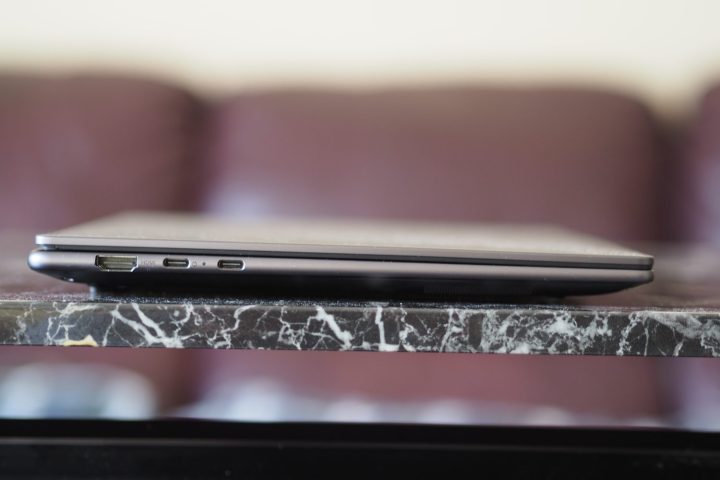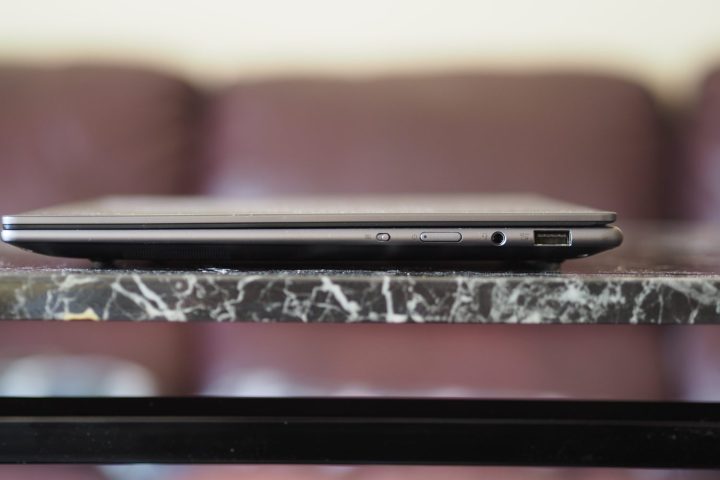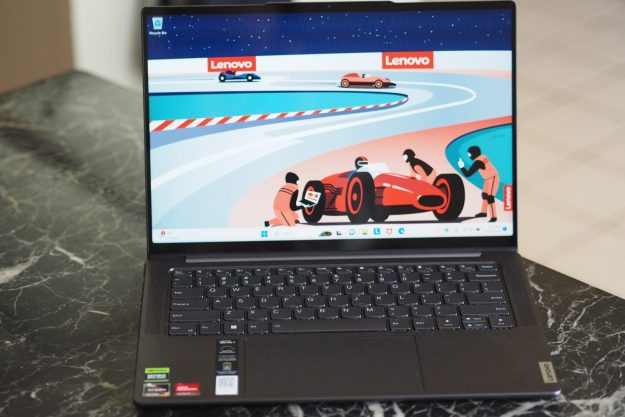
“The Lenovo Slim 7 14 manages to balance solid performance in a thin and light machine.”
- Excellent productivity performance
- Good entry-level gaming
- Competent battery life
- Attractive and mostly solid build
- Good keyboard and touchpad
- Lid is a little bendable
- No Thunderbolt 4
- Fans spin up
Lenovo has invested a lot in making thin and light laptops that manage to offer significantly more power than the rest of the field. The Lenovo Slim 7 Pro X was one example, and the newest Slim 7 14 is even thinner (but a bit heavier). It packs in one of the newest AMD Ryzen 7 CPUs, along with a discrete GPU, making for a machine that’s easy to carry around and also packs a punch.
It’s a well-built laptop with modern good looks, and it manages to fit a larger 14.5-inch display into a chassis size that usually houses 14.0-inch panels. It’s fast and getd good battery life, making its near-midrange pricing even more attractive.
Specs and configurations
| Lenovo Slim 7 14 | |
| Dimensions | 12.81 inches x 8.92 inches x 0.61 inches |
| Weight | 3.5 pounds |
| Processor | AMD Ryzen 7 7735HS |
| Graphics | Radeon Graphics Nvidia GeForce RTX 3050 |
| RAM | 16GB |
| Display | 14.5-inch 16:10 QHD+ (2,560 x 1,600) IPS, 90 Hz |
| Storage | 512GB PCIe 4.0 SSD |
| Touch | Yes |
| Ports | 1 x USB-A 3.2 Gen 1 1 x USB-C 3.2 Gen 2 1 x USB4 1 x HDMI 1 x 3.5mm audio jack |
| Wireless | Wi-Fi 6E and Bluetooth 5.1 |
| Webcam | 1080p with infrared camera for Windows 11 Hello |
| Operating system | Windows 11 |
| Battery | 73 watt-hour |
| Price | $1,200 |
Right now, just one configuration of the Slim 7 14 is available. You’ll pay $1,200 for an AMD Ryzen 7 7735HS CPU, 16GB of RAM, a 512GB SSD, a 14.5-inch IPS display, and an Nvidia GeForce RTX 3050 GPU. That’s a reasonable price for the components and, as we’ll see, for the performance. Other configurations are likely to become available over time.
A well-designed near-midrange laptop
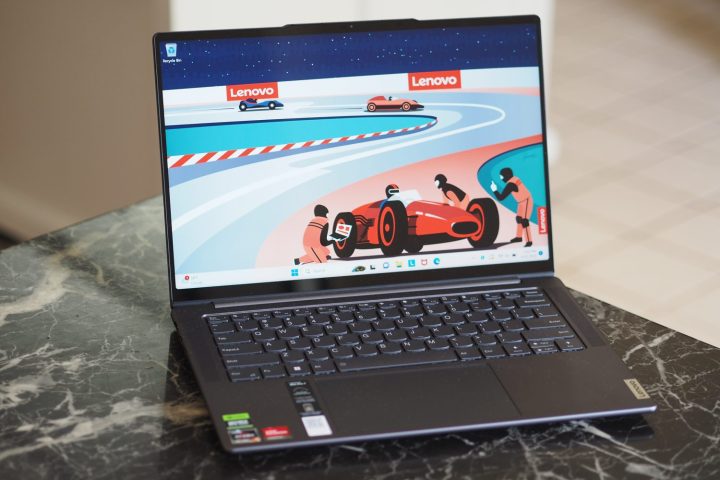
The Slim 7 14 doesn’t quite keep up with the Slim 9 in its aesthetic. Its edges aren’t as rounded and they’re not chrome-accented, and the Slim 7 14 doesn’t have the Slim 9’s glass covering on the lid. But it’s still an attractive laptop, with edges that aren’t as sharp as the competition’s and sleek lines that give it a modern look.
Contributing to the latter are small display bezels that result in a 91% screen-to-body ratio. That’s not quite to the same standards as Dell’s XPS line, but it’s close enough. Up top, you’ll find Lenovo’s now-iconic reverse notch that houses the 1080p webcam and infrared camera for Windows 11 Hello passwordless login support.
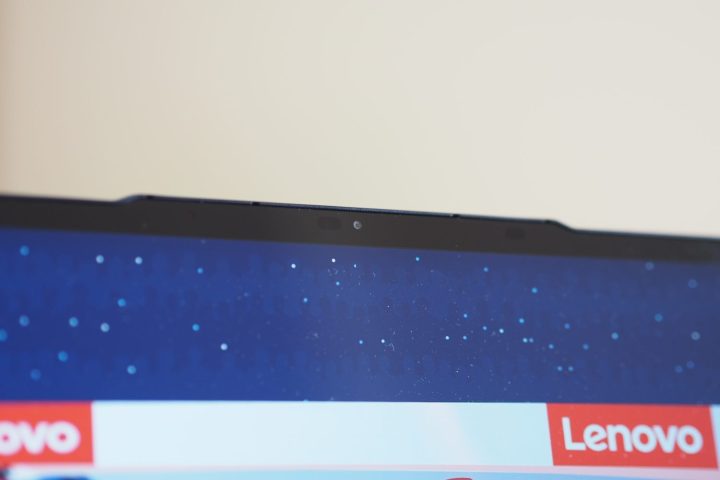
The Slim 7 14 also doesn’t quite live up to the Slim 9 in terms of its build. While the machine is made of all aluminum and the base chassis is solid, there’s a little bending in the lid. That also falls behind the XPS line, which has the best solidity among Windows laptops, and it can’t keep up with the Apple MacBook 14 either. Even so, it’s solid enough, especially at its attractive price that places it more in midrange than premium territory. And Lenovo subjects it to MIL-STD 810H military-grade certifications, which should inspire some added confidence.
The keyboard offers just enough travel, with soft, snappy switches and large, sculpted keycaps. It’s a comfortable keyboard that’s just a step behind the best, such as those on HP’s Spectre line and Apple’s latest MacBooks. The touchpad is large and takes up most of the available space on the palm rest. Its glass surface is smooth and responsive, but I found its buttons a little too loud and harsh.
Connectivity is good, with plenty of ports, including a very welcome HDMI port. The biggest omission is Thunderbolt 4 support, which is due to the AMD chipset. Wireless connectivity is up to date.
Security and privacy are covered by increasingly common user presence-sensing abilities that can put the laptop to sleep when the user walks away and wake it back up when the user returns. There’s also a physical switch to turn off the power to the webcam.
Speed in a thin package
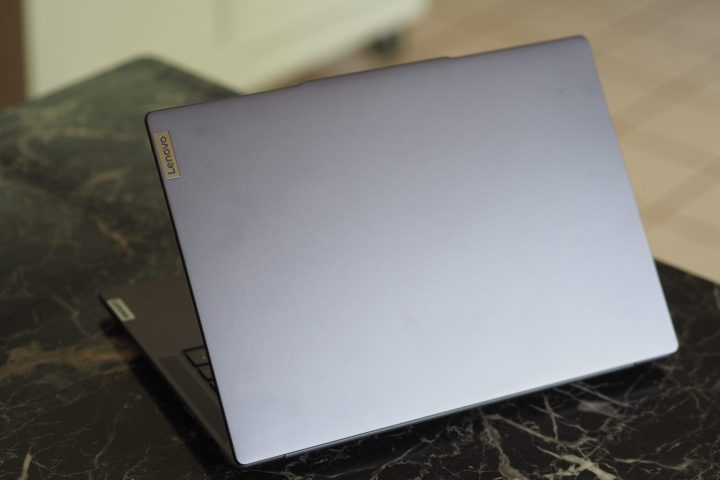
The Slim 7 14 is the first laptop we’ve tested with AMD’s Ryzen 7 7735HS CPU, a configurable 35 watt to 45 watt, 8-core/16-thread processor with a base clock of 3.2GHz and a Max Boost Clock of 4.75GHz. As is typical of AMD’s processors, its multi-core performance was much more impressive than its single-core speeds. It was faster in multi-core performance than the 28-watt Intel Core i7-1360P, but it couldn’t keep up with the 45-watt Intel Core i7-13700H in our suite of CPU-intensive benchmarks. Note that the fans regularly spin up, and they’re a bit louder than I’m used to hearing on thin and light laptops.
Because the Slim 7 14 featuresan Nvidia GeForce RTX 3050 discrete GPU, I also ran the PugetBench Premiere Pro benchmark that runs a live version of Adobe’s Premier Pro application to make use of the GPU to speed up various tasks. It scored 464 in normal mode at 501 in performance mode, which is slower than some laptops with the same GPU and that run Intel CPUs.
The Lenovo Slim 7i Pro X with a Core i7-12700H and RTX 3050, for example, scored 716 and 769. Intel machines tend to do better in PugetBench thanks to much faster scores in the Playback portion of the benchmark ,which apparently benefits from some Intel optimizations. By comparison, laptops with Intel’s Iris Xe graphics score in the 300s, making the Slim 7 14 more than 50% faster and a better entry-level creator’s workstation.
Overall, the Slim 7 14 is a high-speed productivity workstation that can keep up with the most demanding users, and it can do a little creative work on the side. For gamers, the Slim 7 14 is a solid entry-level 1080p gaming machine, achieving an average score for the RTX 3050 of 4,653 in the 3DMark Time Spy test and hitting 49 frames per second (fps) in Fortnite at 1200p and epic graphics (56 fps in performance mode). That’s an average score as well, and quite playable.
| Geekbench 5 (single / multi) |
Handbrake (seconds) |
Cinebench R23 (single / multi) |
PCMark 10 Complete |
|
| Lenovo Slim 7 14 (AMD Ryzen 7 7735HS) |
Bal: 1,493 / 9021 Perf: 1,498 / 9210 |
Bal: 95 Perf: 84 |
Bal: 1,551 / 12,536 Perf: 1,553 / 13,107 |
6,828 |
| HP Dragonfly Pro (AMD Ryzen 7 7736U) |
Bal: 1,473 / 9,061 Perf: N/A |
Bal: 84 Perf: N/A |
Bal: 1,530 / 11,158 Perf: N/A |
6,509 |
| Samsung Galaxy Book3 Ultra (Core i7-13700H) |
Bal: 1,647 / 12,206 Perf: 1,815 / 12,307 |
Bal: 80 Perf: 74 |
Bal: 1,712 / 13,278 Perf: 1,750 / 14,938 |
7,038 |
| Lenovo Yoga 9i Gen 8 (Core i7-1360P) |
Bal: 1,843 / 8,814 Perf: 1,835 / 10,008 |
Bal: 122 Perf: 101 |
Bal: 1,846 / 8,779 Perf: 1,906 / 9,849 |
6,102 |
| Samsung Galaxy Book3 Pro 360 (Core i7-1360P) |
Bal: 1,800 / 8,960 Perf: 1,781 / 9,071 |
Bal: 109 Perf: 99 |
Bal: 1,711 / 8,389 Perf: 1,750 / 9182 |
5,857 |
| Apple MacBook Air M2 (M2) |
Bal: 1,925 / 8,973 Perf: N/A |
Bal: 151 Perf: N/A |
Bal: 1,600 / 7,938 Perf: N/A |
N/A |
AMD’s Ryzen CPUs tend to be more efficient than its Intel competition, but the Ryzen 7 7735HS isn’t quite as much of a standout. It didn’t do as well as the lower-power Ryzen 7 7736U in the HP Dragonfly Pro, and while it beat out the Lenovo Yoga 9i Gen 8 and Dell XPS 13 Plus in two of our tests, it fell behind the Samsung Galaxy Book3 Pro 360. Notably, the Slim 7 14 had shorter results in our video-looping test than I expected.
Overall, the Slim 7 14 offers above-average battery life in two of our benchmarks and might last a full day if your workflow isn’t very heavy. That’s not bad for such a fast laptop with a discrete CPU. Of course, the MacBook Air M2 had phenomenal battery life that continues to stand out.
| Web browsing | Video | PCMark 10 Applications | |
| Lenovo Slim 7 14 (AMD Ryzen 7 7735HS) |
9 hours, 40 minutes | 11 hours, 41 minutes | 10 hours, 34 minutes |
| HP Dragonfly Pro (AMD Ryzen 7 7736U) |
14 hours, 40 minutes | 15 hours, 57 minutes | 16 hours, 31 minutes |
| Lenovo Yoga 9i Gen 8 (Core i7-1360P) |
7 hours, 41 minutes | 13 hours, 25 minutes | 9 hours, 40 minutes |
| Samsung Galaxy Book3 Pro 360 (Core i7-1360P) |
12 hours, 57 minutes | N/A | 12 hours, 21 minutes |
| Dell XPS 13 Plus (Core i7-1280P) |
8 hours, 0 minutes | 9 hours, 20 minutes | 6 hours, 52 minutes |
| Apple MacBook Air M2 (Apple M2) |
17 hours, 59 minutes | 21 hours, 9 minutes | N/A |
A good but not great display
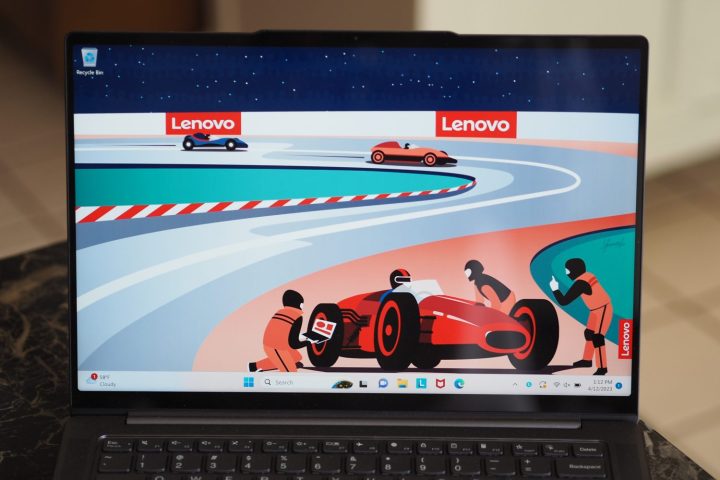
Something you’re giving up with the lower price is OLED and mini-LED. The Slim 7 14 has a 14.5-inch QHD+ (2,560 x 1,600) IPS display running at 90Hz. It’s a fine display that looks good out of the box, but spend a few hundred dollars more on a laptop and you can get better colors, deeper contrast, and higher brightness.
According to my colorimeter, the Slim 7 14’s display was close to the premium average across the board. It had good brightness at 375 nits and solid contrast at 1,290:1. Its colors were just a bit wider than average at 100% of sRGB and 80% of AdobeRGB (most premium IPS displays hit around 75%), and they were decently accurate with a DeltaE of 1.73.
The laptop will do well for productivity work, but creators will want wider and more accurate colors. Its high dynamic range (HDR) quality in streaming video wasn’t bright enough, but it was still worth using thanks to Dolby Vision support.
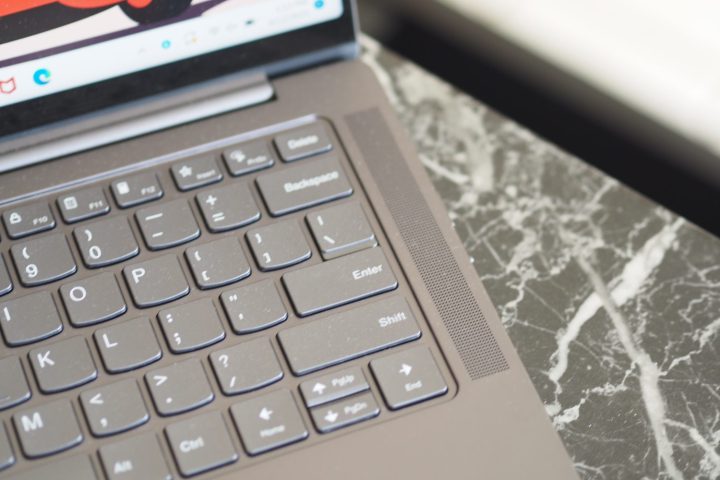
The four-speaker audio put out sufficient volume that was very clear, with no distortion and good mids and highs. There was even more bass than usual. The audio wasn’t up to the standards of the MacBook Pro, which is the best, but it was usable for binging Netflix and listening to the occasional tune.
A solid value with great performance
If you’re looking for a thin and light laptop for demanding productivity work, with some light creative tasks tossed into the mix, and you don’t want to spend a lot of money, then the Lenovo Slim 7 14 is a great choice. It provides excellent performance and the ability to play some games as long as you use the right settings, and it’s well-built and comfortable to use.
You can spend more money on a 14-inch laptop, but there’s no reason to do so unless you’re looking for an OLED or mini-LED display. The Slim 7 14 might not be the most exciting laptop in the world, but it should meet the needs of most people.
Editors’ Recommendations
Services Marketplace – Listings, Bookings & Reviews

